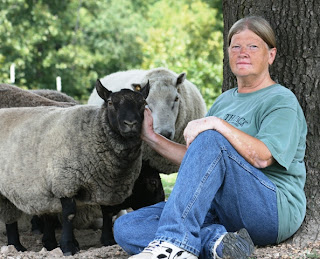 |
| Rumbler and me |
This is my second excerpt from Storey's great Inside Storey blog. I'll start posting new content later this week, so please come back often—and tell your friends!
Friday, July 23, 2010
Every once in a while someone e-mails to ask me, “How can I become a writer?” They’re likely annoyed when I respond, “Go to the library, check out some Writer’s Digest books, read them, then write.”
That’s exactly how it happened for me. Flash back to August of 1969. My infant daughter is 2 months old, my husband and I are short of money, and I’ll have to go back to work — soon . . . at the automotive wiring factory where I worked before my baby’s birth. Ugh. I don’t want to put my daughter in day care. But what to do? I have no college education, no prospects.
Then The Western Horseman came in the mail. As I flipped through the articles, it occurred to me, “I could do this. I can write, and I know horses.” But how to begin?
Before the Internet there were libraries, and libraries were my dearest friends. I took myself to the
And I found a sitter for Robin and went back to work at the automotive factory. Still, I watched my mailbox. Closely. Imagine my delight when all three articles sold — and each for more money than I made in a week at the factory!
I didn’t quit my day job, but those early sales gave me the hope I needed to keep on writing. Except for a few hiatuses between then and now, I’ve never stopped.
Another epiphany occurred in 1992 when I bought a copy of Cherry Hill's Becoming an Effective Rider. What a cool book! I looked inside; it was “A Garden Way Publishing Book” by Storey Communications. Yep, I told myself, I’m going to write a book for Storey some day.
The years passed, and hundreds of horse articles down the line, Karen Keb of Horse Illustrated asked if I’d like to write for a brand-new magazine, Hobby Farms. I loved writing for Karen, and she was to be Hobby Farms’s editor in chief. Just like that, life took a new direction.
Instead of everything equine, I wrote about haymaking, rare pigs, and crafting cheese. And about tools (for the Tools of the Trade column); that took a lot of research!
In late 2003, out of the blue, BowTie Press (a division of BowTie Inc., the organization that publishes Horse Illustrated and Hobby Farms) phoned me about writing books in their new Hobby Farms handbooks series, one about chickens, the other about sheep. I happily agreed.
The upcoming year was . . . interesting. I went through a succession of five project editors on Hobby Farms Chickens alone. I’d finally understand what one of them wanted me to do, then she’d quit her job and another would appear. I was ready to toss writing books when the heavens opened up and Jarelle Stein became my project editor (and has remained so ever since). Oh, happy day! Book writing became a pleasure after all.
Carol Ekarius and I were exchanging e-mails in 2006 when I mentioned my dream of writing for Storey. Carol gave me Deb Burns' address, and correspondence ensued. I quickly realized I had found my writing home at Storey.
Now, through ups and downs and thanks to my editors’ patience (life seriously got in the way of my progress several times), I’ve written six books for Storey, I’m wrapping up my seventh, and hopefully have a series of livestock books for children waiting in the wings.
Which goes to show that if you want to write, you can write. I did it; you can do it, too. This is the advice I give my writer wannabees (at least one of them followed through and made it really big!):
- Read everything you can about the craft of writing. If your library doesn’t carry a lot of writers’ books and CDs, scope out the Writer's Digest Bookshop for useful titles. You can often buy them used at Amazon.com for pennies. However, always choose the current Writer’s Market (if you freelance you'll need a new one every year), and home in on books with such titles as The 28 Biggest Writing Blunders (And How to Avoid Them) and Write Tight: How to Keep Your Prose Sharp, Focused and Concise (in all seriousness, I reread these books at least once a year).
- Accept that, to sell, you must write what editors want, not necessarily what you want to write about. Forget about a book of your memoirs or magazine articles espousing your personal opinions. I wrote about tools for 5 years (try to get excited about power washers or tree-limb saws). Boring, but money in the bank.
- Learn to live with rejection. Not everything sells the first time out; query another editor, tweak it for another market, and send it out again. And don’t take editing personally. My heart plunges to my feet the first time I read my edited book manuscripts, but editors know better than writers what sells, and selling books and magazines is what it’s all about.
- Write. Write voraciously. Write even when you don’t feel like it. Keep tweaking your craft; keep sending out material. Persevere. That’s the bottom line. Don’t give up prematurely.
To bring this blog entry up to date, I want to mention a fantastic resource I recently discovered. It's Jeff Goins' ebook, You Are a Writer (So Start Acting Like One). It's an inexpensive download and the best writing book I've read, ever. If you want to be a writer, get it. And subscribe to his blog and read the archives. I promise you won't be disappointed.

No comments:
Post a Comment